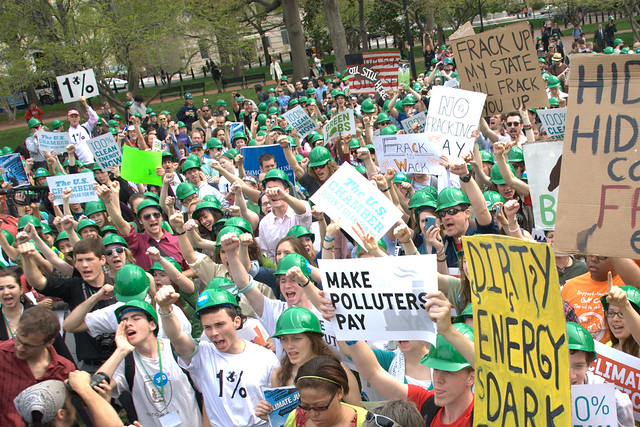
Unfortunately I wasn't able to attend Power Shift this year, though the friends I've talked to about it have all said it was an incredible experience. Thankfully in the technology age I've been able to follow along with a lot of the action on Twitter (which has officially displaced Facebook as my social media outlet of choice; follow @agmaynard). During my internet explorations I came across two videos of speeches that I think are worth sharing. The first is Bill McKibben, author and the founder of 350.org. The second is Tim DeChristopher, a climate activist who was in the news recently for crashing a federal auction and bidding nearly $1.8 million for oil and gas leases he had no intention of paying for.
Let's listen to McKibben first:
McKibben speaks about corrupt politics in Washington, and how we can't let dirty money (largely from the Chamber of Commerce and the industrious Koch bothers, pun intended) win out in the end. He says building a movement that is louder and more impassioned than the opposition will be the key to achieving the significant policy victories necessary to prevent catastrophic changes to the climate system. We've already caused 1 degree of warming (that's Celsius, by the way) and if we get to 5 or more we're cooked. It's up to us to make sure that doesn't happen in the next hundred years or so.
Some highlights:
- They [politicians] believe that because they can amend the tax laws they can amend the laws of nature too, but they can't. (on Congress voting to deny anthropogenic climate change).
- The first thing we need to do is build a movement. We will never have as much money as the oil companies so we need a different currency to work in. We need bodies, we need creativity, we need spirit. 350.org has been like a beta test for that movement.
- We need to fight with art and with music too, not just with the side of our brain that likes bar graphs and pie charts but all our heart and all our soul.
- We need to speak with one loud voice.
DeChristopher's portrait of the future is far more dark than McKibben's. He speaks of the challenges we'll face and the sacrifices that must be made. Because the carbon we've already emitted into the atmosphere is there to stay, we are on track for the collapse of modern civilization. The greatest challenge moving forward will not be reducing emissions, but maintaining our humanity through the troubles to come. He also describes why events like Power Shift do little to prevent this from happening. "There's a lot of stuff about this movement that feels really good and that's really convenient but it's not preparing us for the challenge that we will face ahead of us," says DeChristopher. Of the problems we'll inherit he says, "We're not going to meet it in a convenient way. We're not going to meet it in a way that fits into our school schedules. We're not going to meet it in a way that we can avoid sacrifices." Without using these exact words he says this is war.
Through their speeches I think McKibben and DeChristopher describe different means to the same end. Both use the term civil disobedience, but I don't know if McKibben would support the types of interference his counterpart does (after all, DeChristopher is likely facing 5-10 years in prison for the gas lease auction bids). McKibben advocates for the "movement," for using the political capital built through organizations like 350 to influence policymakers in Washington. DeChristopher on the other hand advocates direct action, picketing at mountaintop removal sites for example. What's interesting about this suggestion is it would probably work and wouldn't end in a prison sentence (at least I'd hope not). But how many of you would actually travel to West Virginia and engage in this type of protest?
There is a palpable tension between what we need to do and what we are willing to do to solve the crisis of our generation. After listening to these perspectives one after another I find myself asking, "How far would I go to bring about the positive change we need?"
No comments:
Post a Comment